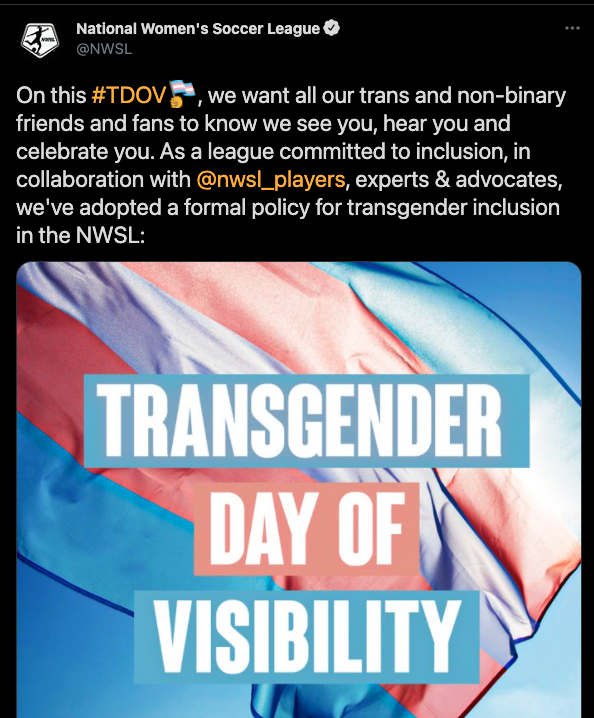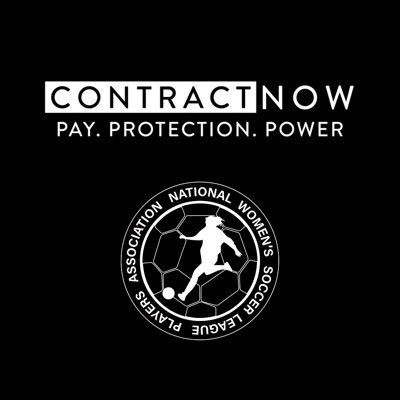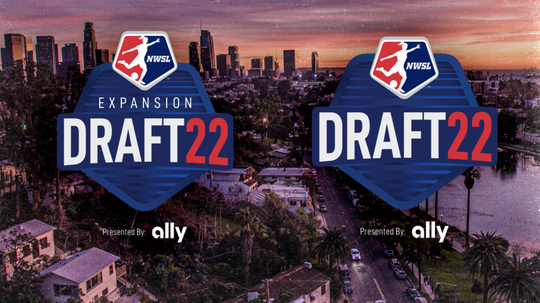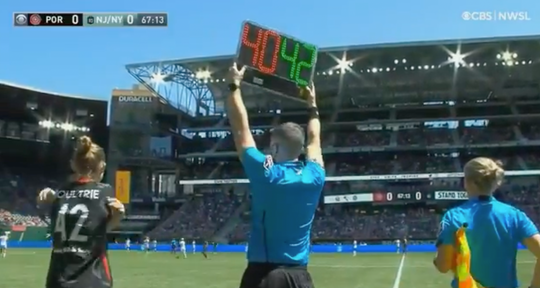I'm having a really hard time reconciling the NWSL's trans athlete policy with its self-professed trans and nonbinary inclusion. "We see you, hear you and celebrate you," the NWSL tweeted on Trans Day of Visibility – but I haven't seen the league do anything to support that message. In fact, what I've seen suggests something closer to the opposite.
Andrew has already broken down the policy itself, exploring how it fixates on arbitrary testosterone levels and does not adequately account for the fact that nonbinary people exist. In this way, the NWSL's rules are antithetical to its stated mission of trans inclusion.
Because the fact is this: on Trans Day of Visibility, the NWSL released a policy written by cis people that regulates trans bodies. It's a set of rules predicated on binary ideas of gender and sex, with no acknowledgement of people who fall outside of those parameters – including the only out trans player in the league. And that policy is the only thing the NWSL posted about trans people on that day; it did not acknowledge Quinn, trans athletes in any other sport, or any out trans person.
Which is to say NWSL social media did not celebrate visible trans people on March 31, but it did promote cis voices, the gender binary, and the policing of trans bodies.
Optics – especially on social media – are surface-level and rarely reflect deeper conversations or values. As The Orlando Sentinel reported, the NWSL did seek input from the National Center for Lesbian Rights and specifically from someone who advocates for trans youth. But intent does not equal impact, and I think impact matters more here. I think impact matters when your version of trans visibility is regulation and erasure and reducing trans people to testosterone levels and only providing a platform to cis voices. It matters when you imply, regardless of intent, that cis people's comfort is more important than the safety of trans athletes.
It matters when these policies inevitably trickle down to provide justification for the slew of bills already aiming to limit trans people in all levels of sport across the country, criminalize trans youth who try to access healthcare, and broadly inhibit trans people from participation in public life.
It matters that when I came out as trans on my high school's soccer team, one of my coaches immediately questioned whether I could still play with them.
Another thing I've been trying to unpack over the past couple weeks is OL Reign and Kansas City adding player pronouns to their online rosters. I don't think it's a bad move on either club's part, but I also don't think it's worth the overwhelming praise I've seen across Twitter or heralding either of these clubs as proponents of radical trans inclusion.
When we, as trans people, ask cis people to add their pronouns to their bios, it's to create space for us to do the same if we so choose – and to not be singled out for that choice. I think it's great that OL Reign is giving Quinn the space to do that. And I also hope that every other player on that roster who is listed under she/her pronouns is using them as a way to support that space and their teammate – and not because the club is forcing them to choose between using she/her pronouns or outing themselves before they are ready.
But putting pronouns in your bio or on your roster page isn't going to end transphobia by itself, and I also hope OL Reign is doing more than that to actively support Quinn and other trans athletes. I hope Kansas City is doing something to support trans people other than putting she/her in all their players' bios – especially when Missouri is one of the states introducing legislation to deny trans girls' access to sports and bar trans youth from gender-affirming treatments.
I've emailed both these clubs for comment on their decision to add players' pronouns to their rosters and what else they're doing to support trans athletes. I haven't heard back from either, but I hope the answer isn't nothing, because both these clubs have a platform and a perfect opportunity to use it.
Based on the NWSL's trans athlete policy, though, I don't really expect all that much to change. And I think that's a huge missed chance, especially if the league doesn't center and listen to feedback from trans people going forward.
The NWSL had a moment where it could have placed itself as a leader on the topic of trans inclusion policy in sports, but instead it created a policy that reads nonbinary people through a binary lens and reduces that gender binary to testosterone levels.
I wasn't expecting the policy to be perfect. But I did expect a set of rules that were prompted by the public profile of a nonbinary trans athlete to not frame said nonbinary trans athlete through a socially constructed binary framework. Or at least rules acknowledging that nonbinary people exist.
NWSL general counsel Lisa Levine told All for XI that she welcomes feedback on the league's trans policy.
Through an optimistic lens, I hope the league follows through and learns from its mistakes here. I hope it acknowledges that reducing sex and gender to a binary plays in favor of the colonialist and white supremacist narratives that established that dichotomy. I hope they realize that perpetuating these ideas and policies also harms cis women – especially cis women of color – even if the league said the policy only applies to trans athletes.
I hope the NWSL examines its provision about challenging an athlete's eligibility and realizes there is no such thing as a "good faith" way to do so. I hope they realize that this policy, and their overall attitude about trans issues more broadly, safeguards cis people's comfort at the expense of trans people's safety.







